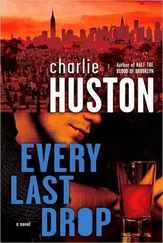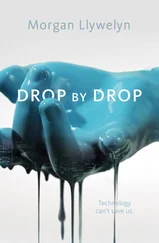She turned to him as if for a kiss, her hair soft against his face. “Yes!” she said. “Yes! Wasn't it amazing? What was it-a hawk?”
“I don't know, but it's a good omen, don't you think?”
Tom Krishna was leading a chant. Everybody clasped hands and she leaned away a moment to take hold of the person on her left-it was Weird George, with chicken bones knotted in his hair and a string of garlic cloves slung round his neck to ward off vampires-and then came back to him and intertwined her fingers with his. “I'm so happy,” she said. “I never knew I could be this happy, never even suspected it. Aren't you happy too? Couldn't you just die for it?”
He told her he was. And he could.
In Fairbanks, Norm pulled the bus up in front of a diner, and they all filed out, everybody, the whole family, including the dogs, while the goats bleated from their ramshackle pen and Che and Sunshine shot up and down the sidewalk like guided missiles. Nobody had ever seen anything like it. Cars stopped dead in the middle of the street. People came out of stores, the barbershop, town hall. And Drop City, arrayed in all its finery, went into the diner in shifts and ate them out of milk shakes, ice cream, grilled cheese, hamburgers, tuna salad, lettuce, lemon meringue pie and soup of the day, and all of it at triple the price they would have paid in California because every mouthful had to be shipped up from the lower forty-eight. Marco counted out his share and he paid for Star, too, but he sank into his denim jacket and pulled the collar up as if he could lose himself in it-he hadn't seen a salmon yet. Or a caribou. A bear. Even a rabbit.
“Don't worry about the money,” Star told him, tucking the shining ropes of her hair behind her ears. She hadn't washed it in a week. Nobody had washed, but for the odd splash under the faucet at a truck stop or gas station, and Norm refused to stop for a communal scrub-down or swim or anything else though they passed a thousand glittering streams and rivers and lakes so clear they weren't even lakes but a kind of subset of the air. Keep it rolling, twenty-four hours a day, that was Norm's motto.
“I'm not worried,” Marco said, but he was.
Star leaned across the table and took hold of his wrists. “This is America up here, that's the beauty of it. We can get food stamps, unemployment, welfare, just like anyplace else.” Behind her, outside on the street where the sun raked at their sloping brows and kinked their hair and brought the angles of their cheekbones and noses into unblunted relief, three squared-up middle-aged women in flower-print dresses gaped through the window as if they were at the zoo. If he were in a lighter mood, Marco would have waved to them or maybe skewed his tongue in the corner of his mouth and scratched at his armpits, _er-er-er.__ As it was, he just dropped his eyes. “Besides,” she said, lowering her voice, “I have a few bucks put away. For emergencies. And you're definitely an emergency, you know that?”
He didn't know what to say to this, and he was irritated, impatient, tired of the whole dog and pony show. Where were the trees to cut and peel and notch, where was the river, where were the postcard vistas, the fish, the game, nature red in tooth and claw and just crying out to be manipulated and subdued-and enjoyed? What about enjoyment? Where was that on the schedule? He was wrung-out. Depressed. His throat was sore. In his pocket there were sixteen dollars and eighty-seven cents, and when that was gone, there'd be a long precious wait for food stamps and welfare and whatever else the all-giving and Great Society wanted to dole out-and how would the checks even get to them out in the bush? Was there mail delivery up the Yukon? Parcel post? Carrier pigeon? “I'm not worried,” he repeated.
Across the room, too wrought up even to sit, Norm swayed over the Formica-topped tables, forking up the macaroni and cheese special with a side of Waldorf salad, his eyes sucked back into his head with fatigue, exhorting them to eat up, get with it, _mobilize.__ “A hundred sixty more miles,” he rasped, too depleted to shout. “An inch and a half on the map. That's all, people-we're already home. Can you smell it? Smell that river?”
Nobody could smell anything. Their jaws worked, their smiles glistened. It was a festive moment, presided over by a shell-shocked cook and a dazed waitress in a pleated skirt and a blouse with rodeo figures embroidered on the collar. And so what if Fairbanks was exactly like a half-mile strip torn out of any industrial city anywhere in America, like Detroit or Albany or Akron, like the very burgs they'd all escaped from in the first place? They were here. They were in Alaska. The end was in sight.
Norm handed his plate to the waitress and people began to move reluctantly from the counter, the tables, the oversubscribed rest room in back. “Drop City North, man,” he said, spreading his arms to address the room at large, which included an Indian woman of indeterminate age frozen behind a paperback book in the far corner and two red-eared locals hunkered over coffee mugs and staring fixedly at the wall behind the counter as if the secrets of the universe were written there in infinitesimally small letters. “Land of the Midnight Sun!” From where he was sitting with Star, Marco felt detached from the whole scene. There was Norm, the reluctant guru, waving his arms in exhortation, pale and flaccid Norm who never wanted to lead anybody, at the end of his tether in a greasy spoon diner in a place that made nowhere sound like a legitimate destination. Marco felt embarrassed for him, embarrassed for them all, and the flare of optimism that had lit him up at Northway Junction was just a cinder now. This was crazy, he was thinking, the whole quixotic business. If they lasted a month it would be a miracle.
Outside on the street he shared a cigarette with Star, everybody milling around as if this was what they'd come for, to squat in the sun on the dirty sidewalks of a flat-topped frontier town that managed to look both pre- and postindustrial at the same time, sagging log cabins giving way to Quonset huts and abused brick and the rusted-out prefab warehouses that were elbowing their way across the flats like wounded soldiers. Pan and Lydia sat perched on the hood of the Studebaker, the same Top 40 hits you could have heard in Tuscaloosa or Sioux City whining out of the radio in thin threads of recognition, while Verbie and her sister fought over something in a hissing whisper. People kept trooping in and out of the bathroom at the rear of the diner, going back for toothpicks, breath mints, gum-anything to delay getting back on the bus-and then Norm just took Premstar by the hand and mounted the worn steel steps and everybody followed suit. He did a quick head count, the engine turned over with a grating blast of spent diesel, and the bus jerked away from the curb in a black pall of exhaust.
They cranked through the bleak downtown streets, across the Chena River and out the Steese Highway, replete with overpriced diner food, with grease and sugar and phosphoric acid slithering through their veins like slow death. Cigarettes circulated from hand to hand, the odd joint, a bota bag of wine. Maya and Merry blew kisses and flashed the peace sign to the slumped Indians and stave-eyed drunks who seemed to be the only inhabitants of the place, pavement gave way to potholes and potholes to dirt, and then they were folded up in the country again, the world gone green on them and the final stretch of road lapping at the wheels like a gentle brown sea.
Up front, behind the wheel, Norm came back to life. It was amazing. One minute he was dead and buried and the next he couldn't stop bobbing his head, couldn't stop talking, and Marco wondered about that, about how much of the holy and rejuvenating pharmacopoeia Drop City had brought along in their private and communal stashes-ounces, pounds, bales? Norm drummed at the wheel, rotated his shoulders, tapped his feet. He was a tour guide now, leaning into the windshield and crowing out the names of every creek and culvert they passed, lecturing anybody within earshot on the history, geology and botany of the sub-Yukon and the lore of the skin-hunters and prospectors, or what passed for it. “See that?” he said, pointing to an expanse of bleached-out scrub crowded with the thin dark slashes of spruce trees tipped and scattered as if they'd been bulldozed.
Читать дальше












